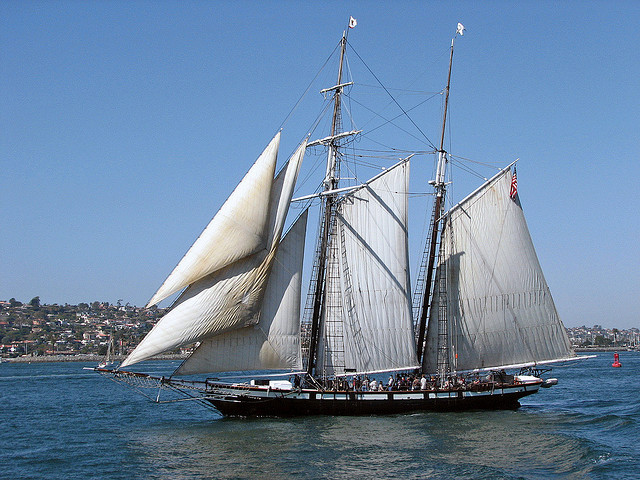The tall ship Californian (port side); photo by avisastry on Flickr (noncommercial use permitted with attribution / no derivative works).
Official State Tall Ship of California
The Californian was designated the official tall ship of California in 2003. All State Ships
From California State Library: "Built in 1984, the Californian is a replica of the 1847 Revenue Cutter C. W. Lawrence that patrolled California's coast during the Gold Rush period. She has nine sails for a total of 7,000 square feet of canvas, weighs 130 tons and measures 145 feet in length. The Californian is owned by the Maritime Museum of San Diego and is used for educational programs including an annual summer tour of the California coast."
Assembly Bill No. 965
CHAPTER 113
An act to add Section 423.5 to the Government Code, relating to state emblems.
[ Approved by Governor July 23, 2003. ]
LEGISLATIVE COUNSEL'S DIGEST
AB 965, Kehoe. State emblems: official state tall ship.
Existing law establishes the state flag and the state’s emblems, including, among other things, the poppy as the official state flower and the California redwood as the official state tree.
This bill would establish “the Californian” as the official state tall ship.
Bill Text
The people of the State of California do enact as follows:
SECTION 1. (a) In 1983, the Assembly adopted with the Senate concurring, Assembly Concurrent Resolution No. 69, relative to the tall ship Californian, and designating the Californian as the official tall ship ambassador of California.
(b) For the last 20 years, the Californian has served as the official tall ship ambassador of California and the Californian represented the State of California during the 1984 Olympics held in Los Angeles and at OP-Sail 86 which celebrated the centennial of the Statue of Liberty in New York Harbor and the Californian has also represented the state numerous times in locations such as Hawaii, Canada, Mexico and most recently during the California Sesquicentennial in 1999 and the Tall Ships Challenge California 2002.
(c) The Legislature commended the Nautical Heritage Museum located in Orange County for the construction of the Californian, a full-scale recreation of the 1848 vintage Revenue Cutter Lawrence. The Lawrence sailed from Washington D.C. in November 1848 for California, tasked with the responsibility of bringing law and order to America’s newest and wealthiest maritime acquisition. The Lawrence arrived in San Francisco on October 31, 1849, nearly a year after her departure.
(d) For two years, Lawrence operated along the California coastline between the cities of San Diego and San Francisco, enforcing customs regulations, assisting in the rescue of some ships and the quelling of mutiny in others, imposing the peacemaking authority of her company and her cannon on a frequently turbulent and riotous San Francisco, and, in general, exerting the authority of the United States government.
(e) En route to San Francisco from a patrol of southern California ports, on November 25, 1851, the Lawrence wrecked off Point Lobos, ending the career of the first ship to lend substance to the notion of California’s statehood by being the only expression of United States government authority.
(f) The Californian was built from the ground up in 1984 at Spanish Landing in San Diego Bay. Since its launching in 1984 the Californian has served as an educational tool for Californians of all ages in the distinguished tradition of California tall ships.
(g) The Californian was recently acquired by the San Diego Maritime Museum, which also maintains and operates the iron sailing ship Star of India, the oldest active ship of any kind in existence and maintains the historic steam ferry Berkeley as well as other precious and historic maritime assets. The Star of India and the Berkeley are each designated national and state historic landmarks. The preservation of California’s precious maritime heritage is the primary goal of the San Diego Maritime Museum and the museum is to be commended for its plans for refurbishing the Californian.
(h) Nowhere in the world today does there exist a replica of these early Revenue Cutters that once protected America’s coastlines. The building of the Californian restored to California’s shores the grace, beauty, and indomitable spirit of the single coast guard cutter that maintained law and order during the frenzy of California’s Gold Rush.
(i) The Californian carries a carved figurehead of Queen Calafia, namesake of California, and the ship’s transom ornamented by two California golden grizzly bears on either side of a flowing ribbon in which her name is carved.
(j) The educational and cultural potential of the Californian as an embodiment of California’s role in the great age of sail is thereby enhanced through its membership in one of the world’s great institutional collections of historic ships. The San Diego Maritime Museum will operate the Californian as an educational vessel and historic asset to promote and encourage an appreciation of the maritime heritage and coastal resources of the State of California.
(k) The San Diego Maritime Museum will make the Californian available to the state for official functions and to represent the state at tall ship events, and sail the Californian along the California coast to visit other ports and nautical museums so that all Californians can learn about the proud nautical heritage of California.
(l) Other states such as Massachusetts, Maryland, New Jersey, Pennsylvania, and Rhode Island have designated official tall ships for their states.
(m) The State of California has adopted numerous state emblems, and with passage of this measure, the Legislature declares the Californian to be California’s official tall ship.
SEC. 2. Section 423.5 is added to the Government Code, to read:
423.5. “The Californian” is the official state tall ship.

